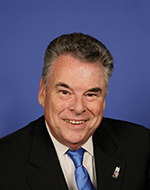The Honorable Peter King: Working to Support Cancer Research Funding and Access to Early Detection
Age: 76
U.S. Representative for New York’s 2nd Congressional District

Cancer has had a profound impact on my life through the experiences of my loved ones. My first family experience with cancer was in 1976, when my father was diagnosed with prostate cancer at age 60. He had never undergone an annual physical, and in those days most men didn’t know about prostate cancer and never spoke about it. Though he still had a few intervals of seemingly good health, he passed away in 1982 after a lot of quiet suffering.
Since my father’s diagnosis, many other close family members have battled cancer. In 1979, my niece was stricken with childhood cancer before she turned 3. Though she survived, the chemotherapy she received caused cardiomyopathy, and she had to have a heart transplant when she was 10 years old. My mother was diagnosed with breast cancer in 1986, when she was 69. She had a mastectomy and lived until she was 90. Her cancer never recurred. My brother was diagnosed with leukemia in 1996, when he was 49. He was treated with chemotherapy and has been in good health ever since. My daughter was diagnosed with breast cancer in 2018, when she was 45. She had a lumpectomy and radiation with no chemotherapy and is in excellent health.
I can’t overstate the importance of early detection for cancer. I believe that early detection saved my daughter, mother, sister, and niece and would have saved my father if he had gone for a routine physical and paid attention to the obvious symptoms. After seeing what happened to my father, who we all thought of as Superman, I started getting annual physicals. Because of a high PSA [prostate specific antigen], I have had a number of prostate biopsies, which have all been benign.
All of these experiences caused me to be very active in Congress supporting cancer research funding and working to make early detection of cancer available to as many people as possible. Federal investment in medical research is absolutely vital in saving lives. It is also important for our economy and creates good paying American jobs.
It is extremely important that researchers and patient advocates share their stories on Capitol Hill. It is impactful to put a name and a face to a request. Members and congressional staff remember these stories when it comes time to decide which items or bills to support. The Dear Colleague letter in support of National Institutes of Health funding that I colead each year is a great example of the importance of advocacy. Countless groups ask members to support this letter, and it’s a major reason why we get hundreds of member signatures from across the political spectrum. It is also interesting for members to get updates on cancer research from the scientists on the ground. It is particularly exciting to hear about work happening in their district or home state.
I am proud to serve as a cochair of the House Cancer Caucus and colead on the annual appropriations request for the National Cancer Institute. I also colead several funding requests related to cancer research at the Department of Defense, including those for the Peer-Reviewed Cancer Research Program and disease-specific research programs including breast, prostate, ovarian, and kidney cancers.
We must do all that we can to eliminate barriers to detection and treatment of cancer. I am the lead Republican sponsor of H.R. 2428, the Access to Breast Cancer Diagnosis Act, which would require insurance companies to cover breast cancer diagnostic tests the same as screenings. This is of particular importance to me given that my daughter’s tumor was not discovered on a mammogram. I am also a cosponsor of H.R. 1570, the Removing Barriers to Colorectal Screening Act, which would require Medicare to cover the costs of removing polyps discovered during colorectal screenings. Additionally, I am a cosponsor of H.R. 1730, the Cancer Drug Parity Act, which would require oral cancer medications to be covered the same as i.v. medications.
I want to thank all of the scientists and physicians who have dedicated their careers to making progress against cancer. We all owe you a huge debt of gratitude. You have made a difference in every person’s life and I can’t wait to see what future research holds. After my retirement from Congress at the end of this session, I plan to continue advocating for cancer research in any way that I can. This cause is just too vital.
